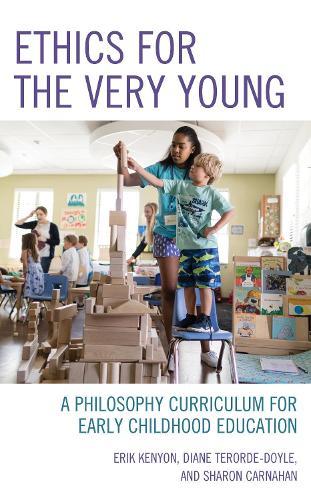Overview
Can you be brave if you’re afraid? Why do we “know better” and do things anyway? What makes a family? Philosophers have wrestled with such questions for centuries. They are also the stuff of playground debates. Ethics for the Very Young uses the perplexities of young children’s lives to spark philosophical dialogue. Its lessons scaffold discussion through executive function games (Telephone, Red Light Green Light), dialogic reading of picture books and Reggio Emilia’s art-based inquiry. In the process, children develop skills of dialogue and critical thinking through increased selective attention, self-control, cognitive flexibility and perspective taking. While the elements of this method are familiar, they are here fused into an organic whole grounded in the history of philosophy and defended by current work in developmental psychology. Building on Wartenberg’s Big Ideas for Little Kids, the present curriculum uses a series of 23 picture books to frame discussions of character, bravery, self-control, friendship, the greater good, respect and care. Its goal is not to “teach morals” but to help children articulate and develop their own perspectives through dialogue with each other. Each lesson presents teachers’ reflections on how this exploration of life's enduring questions transformed their school’s culture.
Full Product Details
Author: Erik Kenyon ,
Diane Terorde-Doyle ,
Sharon Carnahan ,
Thomas Wartenberg, Thomas Wartenberg
Publisher: Bloomsbury Publishing Plc
Imprint: Rowman & Littlefield Publishers
Volume: 1
Dimensions:
Width: 15.60cm
, Height: 1.90cm
, Length: 24.00cm
Weight: 0.399kg
ISBN: 9781475848106
ISBN 10: 1475848102
Pages: 172
Publication Date: 08 February 2019
Audience:
Professional and scholarly
,
Professional & Vocational
Format: Hardback
Publisher's Status: Active
Availability: In Print

This item will be ordered in for you from one of our suppliers. Upon receipt, we will promptly dispatch it out to you. For in store availability, please contact us.
Reviews
Kenyon, Doyle and Carnahan are pioneers in introducing young children to philosophy. Their book is an extremely valuable resource for faculty interested in teaching college level philosophy courses designed to enable their students to work in the classroom with youngsters. It is brimming with great ideas to spark discussion about the value and practice of philosophy for children. Their clear lesson plans serve both as blueprints and catalysts for innovative ways of engaging the very young in philosophical inquiry. Highly recommend as a pedagogical resource for college instructors and as a tool for deepening undergraduates' appreciation of philosophical discourse and method. -- Susan Russinoff, Senior Lecturer in Philosophy & Faculty Fellow, Jonathan M. Tisch College of Civic Life, Tufts University What I love most about Ethics for the Very Young is how closely it aligns to the work I do as a psychotherapist with children, teens, and families. A child exposed to this curriculum will practice the skills necessary to acknowledge their inner voice and develop empathetic, compassionate, and age-appropriate concepts that will lead to an enhanced understanding of self-worth and self-identity. -- Megan Gunter, Owner, Sweet Maple Counseling, Inc.
Kenyon, Doyle and Carnahan are pioneers in introducing young children to philosophy. Their book is an extremely valuable resource for faculty interested in teaching college level philosophy courses designed to enable their students to work in the classroom with youngsters. It is brimming with great ideas to spark discussion about the value and practice of philosophy for children. Their clear lesson plans serve both as blueprints and catalysts for innovative ways of engaging the very young in philosophical inquiry. Highly recommend as a pedagogical resource for college instructors and as a tool for deepening undergraduates' appreciation of philosophical discourse and method. -- Susan Russinoff, Senior Lecturer in Philosophy & Faculty Fellow, Jonathan M. Tisch College of Civic Life, Tufts University What I love most about Ethics for the Very Young is how closely it aligns to the work I do as a psychotherapist with children, teens, and families. A child exposed to this curriculum will practice the skills necessary to acknowledge their inner voice and develop empathetic, compassionate, and age-appropriate concepts that will lead to an enhanced understanding of self-worth and self-identity. -- Megan Gunter, Owner, Sweet Maple Counseling, Inc. The overview of Ancient and Modern Philosophy was a very useful overview of the age old questions that we as adults struggle with everyday. The process allowed me an opportunity to reflect on my own beliefs. Educators of young children will find that understanding ones own beliefs will give them a greater insight in their ability to have open discussions with children. I found that the lessons presented were clear and engaging and the activities age appropriate, Teachers will need supervision and guidance at the start of this journey and time to reflect as a group on responses and reactions of their students. Experienced early childhood educators who understand the importance of open ended questions will now have more tools on their belt to extend deeper thinking among our youngest population. They will also now have a great model to expand the lessons using some of their own favorite books. Enjoy the journey. -- Carol McNally, Early Childhood Professional and Former director of JCC in Maitland Florida
Author Information
Erik Kenyon PhD is author of Augustine and the Dialogue (Cambridge 2018) which explores the intersection of literary form and philosophy of education in Augustine’s earliest works. He has taught at Rollins College since 2012 and partnered with 5 Orlando-area schools through Philosophy for Children courses. Diane Doyle MA has worked in early childhood for 30 years always with an emphasis on social emotional development, inclusive early educational experiences and Positive Behavior Supports with a focus on art as the vehicle for children’s expression of understanding and documentation in the Reggio Emilia tradition. Sharon Carnahan PhD is an applied developmental psychologist who studies young children and their caregiving environments. She is a professor of psychology and has served Rollins College and the Hume House Child Development and Student Research Center since 1992.




